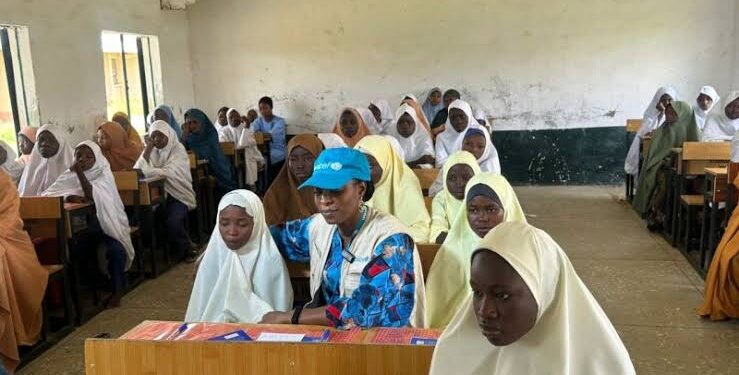The Isa Kaita College of Education, Dutsinma, in collaboration with UNICEF, Kano Field Office, is targeting to train no fewer than 20,000 youths across the state on Artificial Intelligence (AI).
Malam Halilu Ahmed, UNICEF’s focal person at the college, disclosed this in Katsina on Monday, at a training for 700 lecturers, teachers and facilitators on adoption of AI in learning and teaching.
According to Ahmed, the aim of the training on AI is for lecturers, teachers and facilitators to be equipped and step it down to their students across various schools in the state.
He explained that already, they have trained some Coordinators that will carry out the training for the youths, including out-of-school children.
“There are 10 technical schemes who were also trained in Kano on this programme, to oversee the training for the youths across various centres,” he said.
According to him, each of the trained lecturers and teachers is expected to train no fewer than 40 participants, and monitor them, so that at the end, they would get a certificate.
Malam Isma’il Bello, one of the facilitators, and a technical member on the generative artificial intelligence state team, said the training was important.
“You know, there is this development of artificial intelligence, and people are actually taking advantage of artificial intelligence to do all stuff.
“These courses were mounted to ensure that people get to use AI in the right way, especially the young ones. This is the right time to give them the knowledge, so that they don’t misuse it.
“If we allow our society to use the technology without being guided, we’re actually going to face trouble in the future,” Bello said.
He added that about 200 lecturers from tertiary institutions were trained, and now they had trained 300 teachers from secondary schools.
Bello noted that there were other trainees currently receiving training in some CBT centres, to handle out-of-school children.
“You see, the number we are training is actually going to be somewhere around 700 all together, who are also expected to train about 20,000 youths.
“There are three courses that every participant in the training is expected to take, especially generative AI foundation, generative AI medium, and then generative AI master.
“Each of these trainees, after successfully completing a training, will earn a certificate, which is recognised worldwide by Microsoft Corporation, and the certificate is issued by the Federal Ministry of Education.”
One of the participants, Malam Ibrahim Jabir, a Guardian and Counseling Master at GGSS Tsagero, said he had learned a lot from the training, which he did not know before now.
“Now I’m very familiar with them honestly. I think it has been very helpful. And In Sha Allah, we’re hoping to integrate what we learned here to our various schools.
“It’s going to simplify things for us and make things different, especially from the lesson plan, the way we administer our lessons, and the way we handle our students; this time, it is going to be different.”
Katsina Revenue Service urges taxpayers to embrace digital billing system
The Katsina State Internal Revenue Service (KT-IRS) has urged taxpayers to accept digital and central billing to check leakages and enhance tax administration.
The service has introduced a digital billing system code named: Pay-by-Yourself meaning “Biya da Kanka” in Hausa language.
Its Executive Chairman, Alhaji Isyaku Muhammad, said this at a stakeholders’ engagement on Monday in Sandamu Local Government Area of the state.
He said the integrated revenue management central billing system was designed to eliminate leakages and strengthen revenue collection.
Represented by Murtala Muhammad-Kankara, Executive Director of Corporate Services, KT-IRS, Muhammad-Kankara said that similar engagement exercise would be conducted to sensitise tax payers across the state.
He said the central billing system was introduced to simplify tax payment and ensure that revenues were remitted into government coffers.
“The central billing was introduced to eliminate leakages in revenue generation and build confidence that taxpayers’ money goes directly to the government,” he said.
The chairman said the service had opened a website, introduced Tax Identification Numbers (TIN), and produced pamphlets in English and Hausa Languages, to educate taxpayers.
Kabir Isah-Fago, Executive Director, Digital Modernisation of the service, said the system would boost IGR and reduce dependence on federal government allocation.
Also, Usman Nalado, Chairman, Sandamu Local Government Council, pledged to mobilise traditional and religious leaders to sensitise taxpayers in the area.
Nalado described the initiative as a major step towards promoting accountability in the tax administration.
























